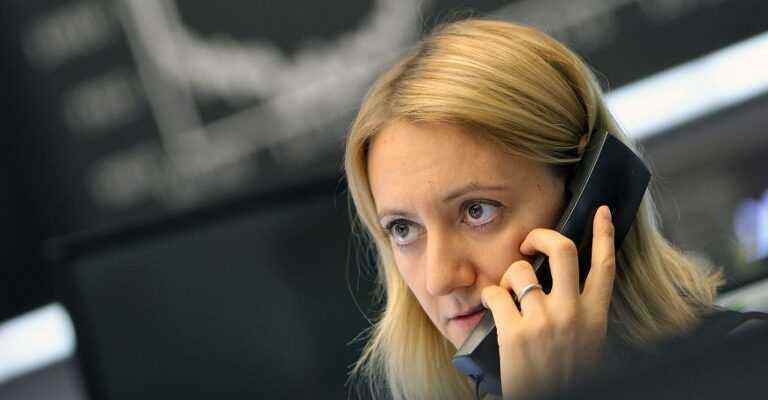(BFM Bourse) – A company considering its share price to be excessively low may see it as an opportunity to intervene with an accretive effect for the benefit of all of its shareholders. Apart from share buybacks, a company can thus launch a public share buyback offer (OPRA) if the target amount exceeds 10% of its capital.
Will the downward trend in valuations observed since the beginning of the year give listed companies ideas? Buying back its own shares is often perceived as an ideal solution for a company – if it has significant liquid assets in relation to its investment needs – since this mechanically improves the profit and the net value per share. In other words, this leads to a “relution” for shareholders who remain invested.
Listed companies can thus repurchase over time a maximum of 10% of their capital within the framework of a share repurchase program, the implementation of which is generally entrusted to a financial intermediary with whom it is agreed to a maximum intervention price and a daily volume cap depending on the usual liquidity so as not to unbalance the market since these redemptions are made directly in the order book. If a company wants to make a bigger impact and take advantage of a floor price, and buy back more than 10% of the capital at once to cancel them, it can (and must) then launch a Public Takeover Bid for its own Shares, or OPRA, mentioning the maximum number of securities to be redeemed and the price.
Like any public offer, this requires an appropriate formalism submitted to the AMF and requiring a dedicated information note, ie a good month of preparation, not to mention the prior approval of shareholders.
A premium of 20 to 30% generally
The offer is then submitted to all the shareholders, i.e. they all receive an opinion to this effect from their broker or their bank, with a bonus (otherwise it would not be more interesting to bring than to sell directly on the market) on the course which generally revolves around 20 to 30%.
The number of securities contributed to the offer may very well exceed the maximum redemption amount set by the company, in which case a proportional reduction is applied to all contributions. To give an example, if a company offers to buy back its own capital within the limit of 20,000 shares and 25,000 are brought to it, each order will be reduced by 20% regardless of its amount: 20 shares will be taken back from the one who brings 25. , 80 to the one who brings 100, 4000 to the one who brings 5000, etc.
“In the context of the downward trend that we are experiencing on the stock markets (-17.28% since January 1, 2022 for the CAC 40 and -14.51% for the CAC Mid & Small), the OPRA (Offer Publique de Repurchase of its own Shares by a company) could well be a real opportunity for certain Euronext and Euronext Growth issuers”, said Thomas Hornus, partner at EuroLand Corporate.
For the specialist, the OPRA provides significant benefits that are in the interest of all shareholders: those who remain as those who sell. Offering immediate liquidity at a price higher than the market price but without any obligation to tender its shares, the OPRA leads to an automatic accretion for shareholders not taking part in the offer. Net earnings per share (and distributable earnings, if any) per share increase mechanically. Above all, an OPRA constitutes “a positive and strong signal transmitted to the market and to shareholders on the ambitions of the company and on the undervaluation of the company on the stock market”.
Few operations since 2019
“At Euroland Corporate, we consider that an OPRA, carried out under good conditions and at the right time, is a win-win operation (win-win, editor’s note): either the shareholders contribute to the offer, thus pocketing a plus- value compared to the reference stock market price and there is an accretion of “historic” shareholders, or they do not contribute and, generally, the price readjusts to the level of that of the OPRA”, observes Thomas Hornus.
While OPRAs have been few in number since 2019 (Terreis, Idsud, etc.), particularly following the cumulative effects of the Covid-19 pandemic and the surge in prices, “the period of general market decline that we we know in recent weeks could arouse vocations, many listed companies having garnered cash following the end of the crisis”.
The OPRA can also be a first step towards leaving the stock market with the aim of buying back the float without the shareholders in control of the company contributing. This was also the case for Iliad at the end of 2019: while the price was dragging at the end of 2019 under 100 euros (95.06 euros precisely on the eve of the announcement), Xavier Niel’s telecom group had then offered to buy 20% of its own capital via an OPRA significantly above the then price, or 120 euros per share. This operation was followed two years later by the takeover bid and the delisting.
“In this bearish situation, and in the absence of potential targets for interesting external growth, buying its own shares is the best investment for the company to create value”, concludes Euroland, in the absence of course of projects of major investment.
Guillaume Bayre – ©2022 BFM Bourse
